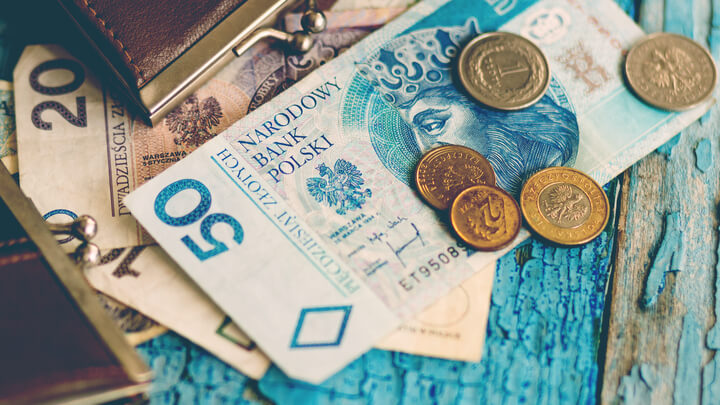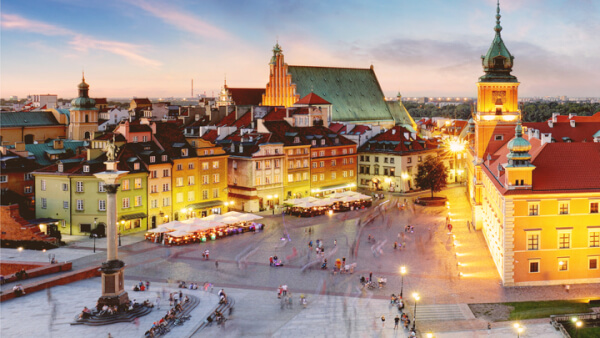ATMs in Poland: Credit cards and fees
Poland’s visitor numbers steadily increase year on year, with tourists and expats alike arriving to hike in the soaring mountains, take a dip along the Baltic...

The official currency of Poland is the Polish zloty (PLN) - (pronounced ZWAH-tee).
This guide covers everything you need to know about spending in Poland. We’ll also introduce a smart way to beat excessive currency conversion costs, using a Wise multi-currency account and debit Mastercard.
| Don’t lose out when you travel - spend like a local with Wise. | |
|---|---|
| Get a free account - and start saving! |
Although the local currency in Poland is the zloty, you may find stores, restaurants and hotels in major cities or around the borders will also accept euro payments.
Poland has a healthy stream of tourists and travellers from the eurozone, so it’s no surprise that some enterprising outlets have adapted to make it easier for people to part with their money. That doesn’t necessarily make it a good idea to rely on euros when you’re in Poland, though.
Firstly, once you get outside of the tourist hubs and bigger cities, you’ll definitely need zloty - and secondly, you might well find the exchange rates used when spending euros are painful.
If you’re offered the opportunity to spend in euros in Poland, remember that the retailer is doing you a favour, and will most likely charge a premium for your convenience. Check the exchange rate offered before you commit, and compare it against the mid-market rate using an online currency converter.
If you’re not happy with the exchange rate, you need a different option. More on a convenient way to dodge these costs, and spend like a local, in just a moment.
| Names & Symbols | Złoty, PLN, or zł |
|---|---|
| 1 PLN | There are 100 grosz (gr) in one zloty (zł) |
| PLN coins | The most frequently used coins are zł1, zł2, zł5, 1gr, 2gr, 5gr, 10gr, 20gr, and 50gr. Each grosz coin will have the number value printed on it along with leaves in the amount of the coin’s value. For example, a 20 groszy coin will have 20 leaves – though the coin is so small, it may be hard to tell. A zł1 coin has 100 leaves, while the zł2 and zł5 coins will have two and five leaves respectively. All Polish coins have the state title and the eagle of the coat of arms printed on the reverse. |
| PLN banknotes | Poland’s bank notes are printed in denominations of 10, 20, 50 100, and 200. The different denominations of Zloty banknotes each have their own color. They also have their own distinct, embossed mark in order to help the blind and partially sighted to identify the bank note’s value: zł10 – squarezł20 – circlezł50 – diamondzł100 – plus signzł200 – triangle |
Most frequent travellers recommend that you change your money once you arrive in Poland for a better exchange rate. You can buy the currency at an exchange office - known as a Kantor - in your destination. It’s usually best to avoid the airport or your hotel exchange kiosk, as the rates here tend to be poor.
If you arrive at the airport with no zloty, you can always use your ATM card to get some local currency, and then exchange your cash once you arrive in the city. The rates used for ATM withdrawals are typically fair - just look out for extra fees added by the ATM operator, to avoid unnecessary expense.
Save when you spend abroad with a multi-currency account and debit Mastercard from Wise.
Conveniently convert currencies via the free Wise app, or let them handle the conversion for you when you spend - all using the real mid-market exchange rate.
This means, no hidden costs and zero transaction fees - so you know exactly how much you’re spending.
| Save when you spend in any currency with Wise | |
|---|---|
| Get a free account - and see how much you can save! |
Banks are easy to find in Poland, especially in larger cities. Be sure to check the hours of a bank before visiting, though, as they vary. ATMs are even more common and can be found at airports, supermarkets, and other popular places. ATMs are available for use 24 hours per day.
It is often recommended that you avoid exchanging currency at the airport or hotel, since they have higher rates. When exchanging currency, always ensure your bills are not damaged or torn, as merchants might not accept them.
The best way to exchange currency in Poland is to visit a bank, ATM, or Kantor (currency exchange service).
Kantors are counter exchanges located in spots like hotels, airports or border crossings. They are normally open from 9 AM to 7 PM on weekdays, and until 2 PM on Saturdays. Busy tourist areas may have 24-hour Kantor services.
The exchange rates will vary, so some suggest shopping around for the best rate. For example, Kantors in larger cities frequently have a better exchange rate than those in smaller towns. You can even negotiate your rate at some Kantors.
As a rule of thumb, you’re looking for the exchange rate that is closest to the interbank (mid-market) exchange rate. The interbank exchange rate is in between the buy rate and the sell rate in global currency markets. If you find a currency exchange that uses that rate, and doesn’t have hidden fees, you should use it.
Warsaw is the capital city of Poland, and exchanging your currency for Polish Zloty needn’t be a painful process. There are plenty of options, whether buying in advance of travelling, or in Warsaw itself. Below are some of the most popular options for currency exchange in Warsaw.
However, it’s worth keeping in mind that the below will still make a charge for currency conversion. Take a look at our currency converter for today’s mid-market rate.
| Company | Contact |
|---|---|
| Kantors with Alior Bank | Multiple locations throughout Warsaw. |
| Bank Pekao | Multiple branches throughout the city. |
| International Currency Exchange | Locations at Warsaw Modlin & Warsaw airports. |
Debit and credit cards are widely accepted in Poland, especially around tourist attractions. The most commonly used cards are Europay International, MasterCard, Visa, and American Express. If you have a card from a less popular vendor, find out if they can be used in Poland before you go.
If you’re given the option to be charged in your home currency, decline it. Always choose to withdraw in Zloty (local currency) rather than in your home currency when using an ATM. Otherwise, the ATM may mark-up the exchange rate you’re getting. This is known as ‘Dynamic Currency Conversion’ and it will cause you to pay extra.
Whenever traveling abroad, be sure to inform your card issuer where you are going and when. This way, they won’t erroneously suspect that your card has been stolen and accidentally freeze your card.
Retain content (with links):
ATMs are very common in Poland. Poland has a network of ATMs that are connected to all international networks called bankomat. Use the online locators to find the nearest ATM for your card to plan where you will get cash once you’re in Poland:
Depending on the ATM and on your bank, you may be charged a variety of fees when using one. Consult with your home bank to see what they will charge you for using an ATM abroad. If your bank charges a flat fee per transaction, try to make large, infrequent withdrawals to prevent paying that fee over and over. The ATM itself may also have its own fees.
If you bank with a global bank, you are likely to find a branch or a partner bank in Poland. Check with your home bank before you go – this could help you save money by avoiding fees.
Alternatively, for simple access to the money you need while you’re abroad - and an even better deal - use Wise.
.
*Please see terms of use and product availability for your region or visit Wise fees and pricing for the most up to date pricing and fee information.
This publication is provided for general information purposes and does not constitute legal, tax or other professional advice from Wise Payments Limited or its subsidiaries and its affiliates, and it is not intended as a substitute for obtaining advice from a financial advisor or any other professional.
We make no representations, warranties or guarantees, whether expressed or implied, that the content in the publication is accurate, complete or up to date.

Poland’s visitor numbers steadily increase year on year, with tourists and expats alike arriving to hike in the soaring mountains, take a dip along the Baltic...

If you’re looking for a city with a taste of the unexpected, Warsaw won’t disappoint. The Polish capital is a city of fascinating contrasts: Modernist...